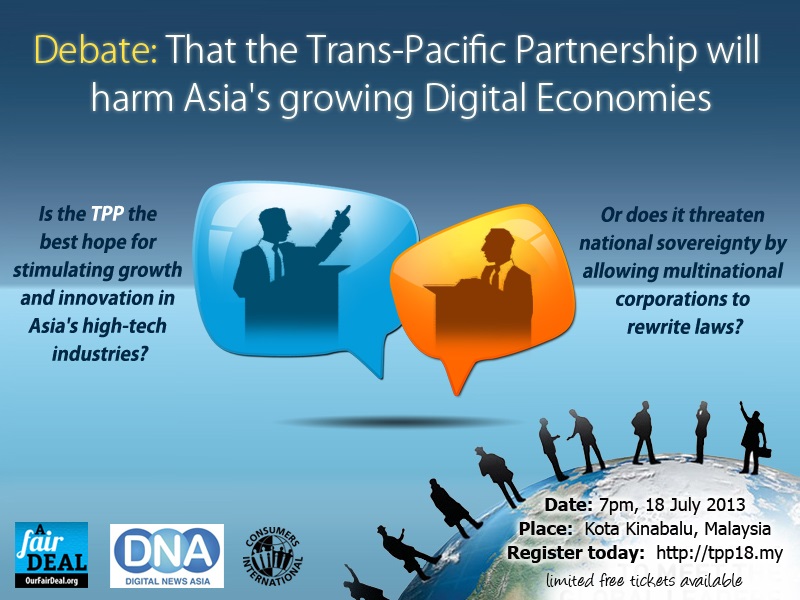Pikom sees great opportunity in TPP
By Karamjit Singh July 11, 2013
- Opening up of markets to ICT will benefit export-oriented firms based in Malaysia
- Standardising e-commerce rules being discussed; to tax or not and other issues
 IN a previous article on the Trans-Pacific Partnership agreement (TPP or TPPA), Digital News Asia announced that together with Consumers International, we will host a free public debate between proponents and opponents of the trade deal.
IN a previous article on the Trans-Pacific Partnership agreement (TPP or TPPA), Digital News Asia announced that together with Consumers International, we will host a free public debate between proponents and opponents of the trade deal.
Since then, the search for proponents has been slow going for the debate next week in Kota Kinabalu. But when it comes to the technology aspects, the National ICT Association of Malaysia (Pikom) has been a strong proponent of the TPP.
Its president and chief executive officer Shaifubahrim Saleh (pic) says that the association feels it will be beneficial to its members, which include local and multinational players, as Malaysia is an exporter of many ICT (information and communications technology) products.
“We already have very low to zero tariffs on these products coming into Malaysia, and are keen to see the same level field in other member countries of the TPP so we can better compete in their markets,” he says.
Pikom sees low to zero tariffs on ICT products entering Malaysia as a positive trend as it allows sophisticated and advanced innovations to be brought into Malaysia, from which Malaysian entrepreneurs can build their winning businesses off.
There are currently12 countries involved in the TPP talks: Australia, Brunei, Canada, Chile, Japan (the latest to join talks), Malaysia, Mexico, New Zealand, Peru, Singapore, the United States and Vietnam.
Others are also said to be lining up, keen to join the pact and enjoy the zero tariffs that the agreement promises for many goods and the greater liberalisation of trade.
In fact, Shaifubahrim says that Pikom’s concern is whether some TPP members, while enjoying the zero tariffs of countries which follow the rules, may themselves impose taxes on products coming into their markets.
“We would like to see close monitoring of the rules when this pact comes into force,” he says.
While there are many who see the TPP with jaundiced eyes, wary of the United States throwing its weight around to tilt the agreement to its benefit, the Ministry of International Trade and Industry (MITI), Malaysia’s lead negotiator has assured Malaysians that, with 16 rounds of talks already, the agreement is being carefully worked at by all the parties to ensure a fair playing field.
Rebecca Sta Maria, Secretary-General of MITI, has also pointed out in an interview with business site KiniBiz.com that because Malaysia is not in certain trade pacts, it is losing out. She said that the TPP would help open some large markets for Malaysian companies and vice versa.
For instance, Malaysia does not have any free trade pacts with the largest economy in the world, the United States.
“Many segments of that market are thus not open to Malaysian companies,” Pikom’s Shaifubahrim notes. This is where the value of the TPP lies.
Hence Pikom’s stance: Since Malaysia is already a very open economy with very few tariffs on ICT goods into the country, it is in Pikom’s interest to promote and ensure Malaysia’s interests are protected in the TPP talks.
“In fact, we can see more opportunities too once Asean itself becomes more open thanks to the TPP,” he says, adding that the recent years have brought about more protectionist rhetoric but that is really a step back for global trade and the liberalisation of goods and services.
One example is e-commerce. “Governments have to decide if they want to tax it and risk stifling cross border business or let it remain tax-free and see free trade boom,” he says.
Beyond the tax issue, the TPP is discussing how to standardise e-commerce to the benefit of the trade pact. For example, it is talking about sites not needing a physical office in the countries they have business in, just the portal will suffice.
All these and many more issues, such as intellectual property rights, are still being hashed out, with Pikom ensuring that Malaysia’s ICT interest are safeguarded while our borders open even more.
 Airing the issue in public
Airing the issue in public
The TPP offers a golden opportunity for Malaysia and other nations to reap the rich rewards of global trade -- or it poses a dire threat to our sovereignty that would allow foreign multinational corporations to rewrite our laws for their own benefit.
Opinions about the merits of the TPP are polarised, making it difficult for ordinary citizens to separate fact from fiction.
So what better topic for a debate, to clear the air and shed some light on this impenetrable and controversial subject?
Consumers International, in partnership with Digital News Asia, is hosting a free public three-on-three Parliamentary-style debate on the proposition “That the TPP will harm Asia’s growing Digital Economies.”
Drawn from across government, industry and NGO communities across the region, the participants will attempt to convince the audience that the TPP is the best hope for stimulating growth and innovation in Malaysia's high-tech industries; or that it will hamstring those industries with inappropriate laws pushed by foreign interests.
The debate is scheduled to take place on July 18 during the 18th round of TPP talks in Kota Kinabalu. To register and find out more as details are confirmed, click here.
Related Stories:
The TPP: Good or bad for Asia’s rising digital economies?
How the Trans-Pacific Partnership threatens online rights and freedoms
E-commerce players: The taxman cometh
For more technology news and the latest updates, follow @dnewsasia on Twitter or Like us on Facebook.


